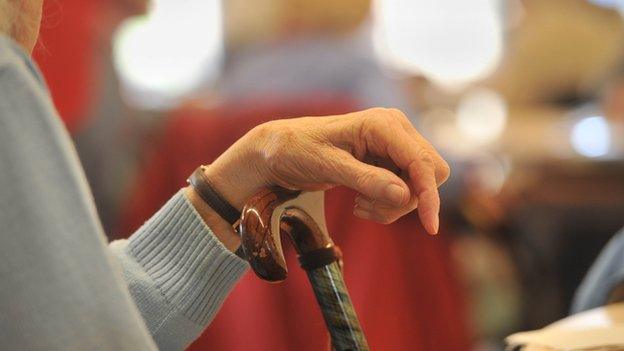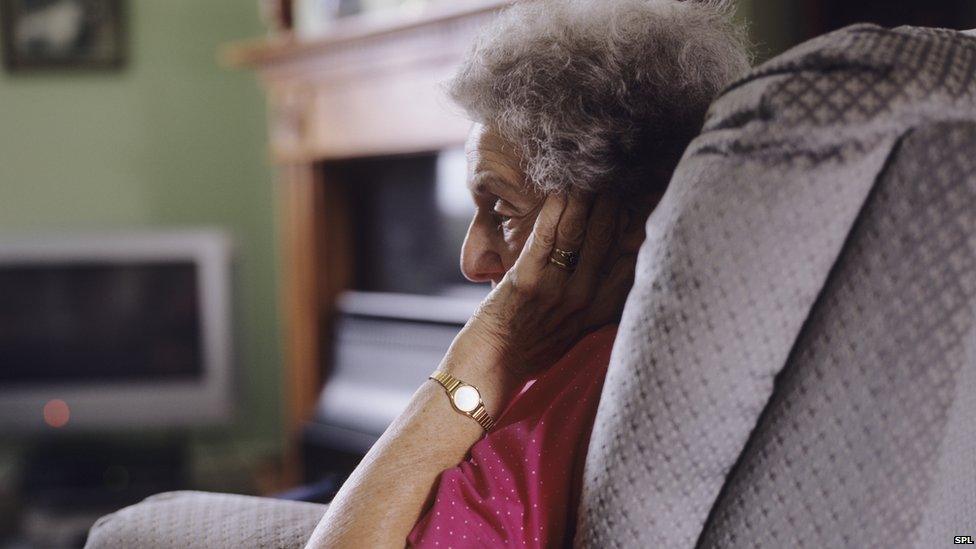Internet training would cut pensioner loneliness, says think tank
- Published

The warnings come as the number of people aged 85 or above is set to double over the next 20 years
Loneliness among the over-65s could be tackled by training more older people to use the internet, a report by a centre-right think tank has suggested.
Policy Exchange has called for every person in the UK to be taught basic digital skills, including how to send emails and use social networking sites.
Training 6.2 million people without basic digital skills would cost £875m by 2020, or £141 per person, it said.
It said training would help pensioners stay connected with friends and family.
Policy Exchange says around 40% of people aged 65 or over in the UK do not have access to the internet at home, while more than five million people have never used the internet.
The report predicts an increasingly elderly population will face a "major challenge" in the future and risk being isolated as families move further apart for work.
With the number of people aged 85 or above set to double over the next 20 years, it says such training will yield "huge" economic and social benefits for the UK.

Case study
Veronica Fenn, 75, from London, has been using the internet for almost 10 years.
"I've watched the information service grow and I absolutely love it.
"It's certainly changed my life. I have everything now at my fingertips. If I wanted to do a crossword puzzle and I get stuck, it's wonderful.
"I can cheat a little bit and if I want to shop or if I want any information about artists, I just type it in.
"I also keep in touch with people overseas with Skype. I couldn't live without it now, I find it so incredibly useful.
"I think there are a lot of us who are rather frightened of technology or machines or television and how to work things.
"I learnt because the public library had a very good facility where you could go and learn how to use the internet and that was very useful indeed."

'Stay connected'
Eddie Copeland, author of the report, said learning basic computer skills would stop pensioners becoming vulnerable to loneliness.
"In an increasingly isolated and fast-moving world it is vital that everyone in society is able to use the internet and understand its benefits," he said.
"From alleviating social isolation, bringing together communities, paying bills and now accessing public services online can improve lives.
"Being able to simply write an email or access a social networking site could provide older people with a way to stay connected to their friends and families, who may live hundreds of miles away."
But Andrew Kaye, from the charity Independent Age which offers advice and support to older people and their families, said: "Encouraging and enabling people to go online could be one really useful means of tackling loneliness - but it's not the only way.
"We mustn't forget that it's really important older people still have a choice about how they access public services so they are not only available online.
"To those without technology skills a trip to the local post office or real human contact is just as important."

Case study
Rodney Farmer, 75, from Bristol says he uses his computer for everything.
"I shop online, I bank online, I use Facebook to keep in touch with friends and family.
"I have a son and two grandchildren in America, so Skype has been brilliant to keep in touch with them.
"Whilst I was still in work in my 50s, I noticed that colleagues were starting to use PCs.
"I went into a shop that specialises in PCs and I was gobsmacked, it was a different world.
"I signed up for computing lessons and now I would call myself a power user: I have four laptops and two home computers.
"It's been a lifesaver for me. If I hadn't got into computing, I think my life now would be very empty.
"Computing has kept me connected and informed."

The report says the cost would be offset by savings of around £1.7bn a year, as people moved to digital rather than paper-based and telephone transactions.
It comes after a Age UK poll of 2,000 over-65s earlier this year found 10% of pensioners described themselves as often or always lonely - a rise from 7% last year.
- Published3 May 2014
